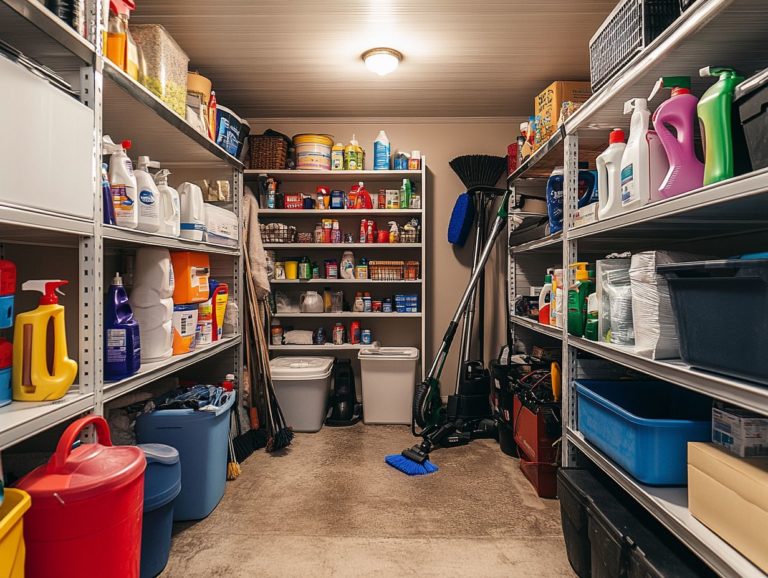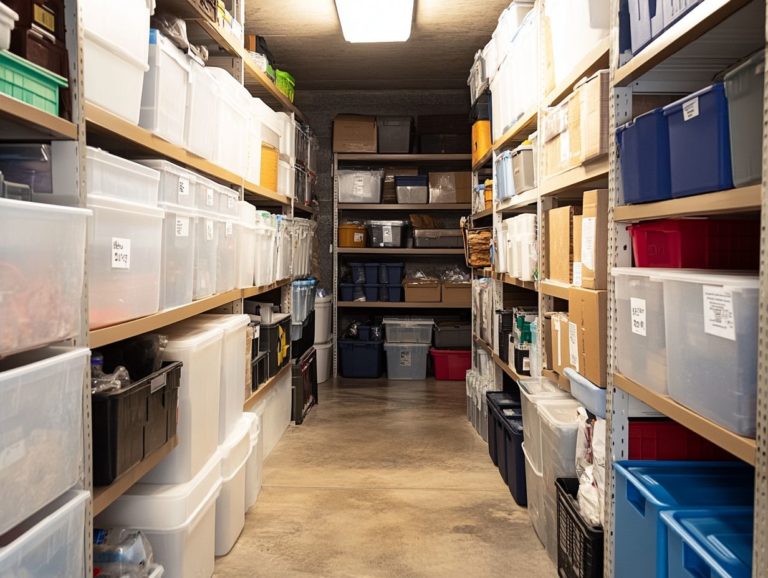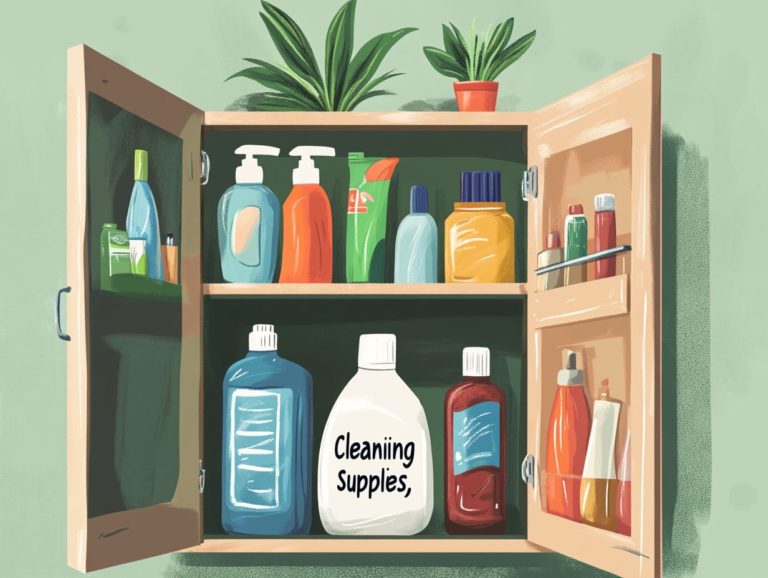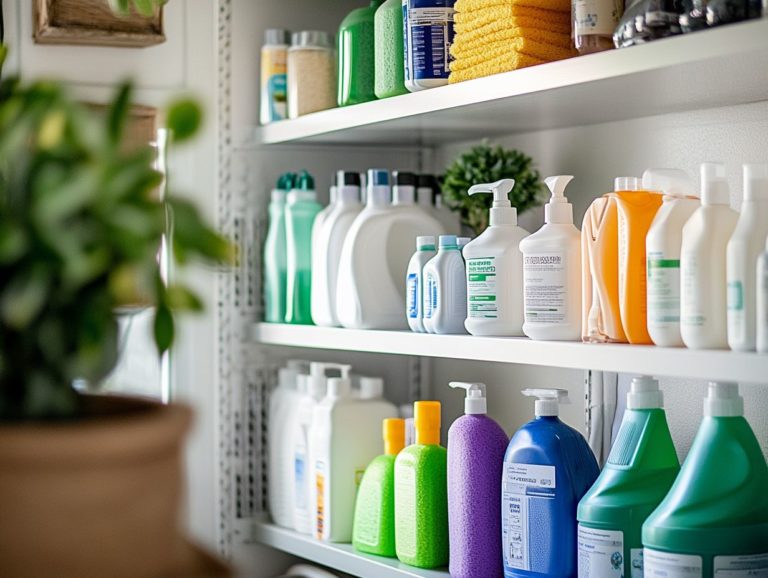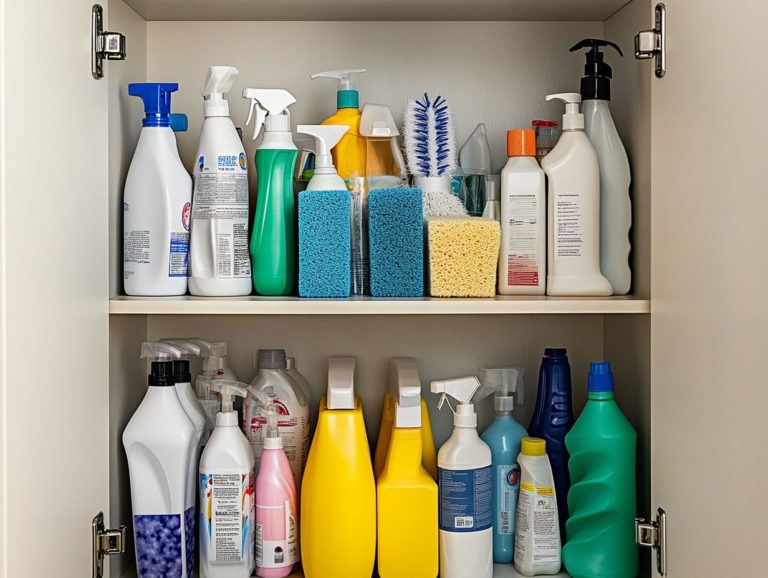How to Ensure Cleaners Are Stored Properly
Proper storage of your cleaning supplies is essential for maintaining a safe and effective home environment. With the array of chemicals you use, improper storage can lead to hazardous chemical reactions, fire risks, and even accidental exposure for children, pets, and other household members. Utilizing maid services can also ensure professional handling of cleaning supplies.
This article delves into why proper cleaner storage matters, the potential dangers of neglecting this task, and practical tips for organizing your cleaning arsenal. From separating different types of chemicals to ensuring your storage space is well-ventilated, discover how to keep your home safe while maximizing the effectiveness of your cleaners. You will also find cleaning safety tips and organizational systems to help you manage your cleaning supplies effectively.
Contents
- Key Takeaways:
- Why is Proper Storage of Cleaners Important?
- What Are the Risks of Improperly Stored Cleaners?
- How Should Cleaners Be Stored?
- What Are Some Tips for Proper Storage of Specific Cleaners?
- What Are Some Common Mistakes in Storing Cleaners?
- How Often Should Cleaners Be Checked and Replaced?
- What Should Be Done with Unused or Expired Cleaners?
- Frequently Asked Questions
- Why is it important to properly store cleaners?
- What is the best location to store cleaners?
- How should I label my cleaners when storing them?
- What is the proper way to store cleaning chemicals and hazardous chemicals?
- What are some common mistakes people make when storing cleaners and cleaning products?
- How often should I check my stored cleaners for expiration dates and perform routine safety checks?
Key Takeaways:
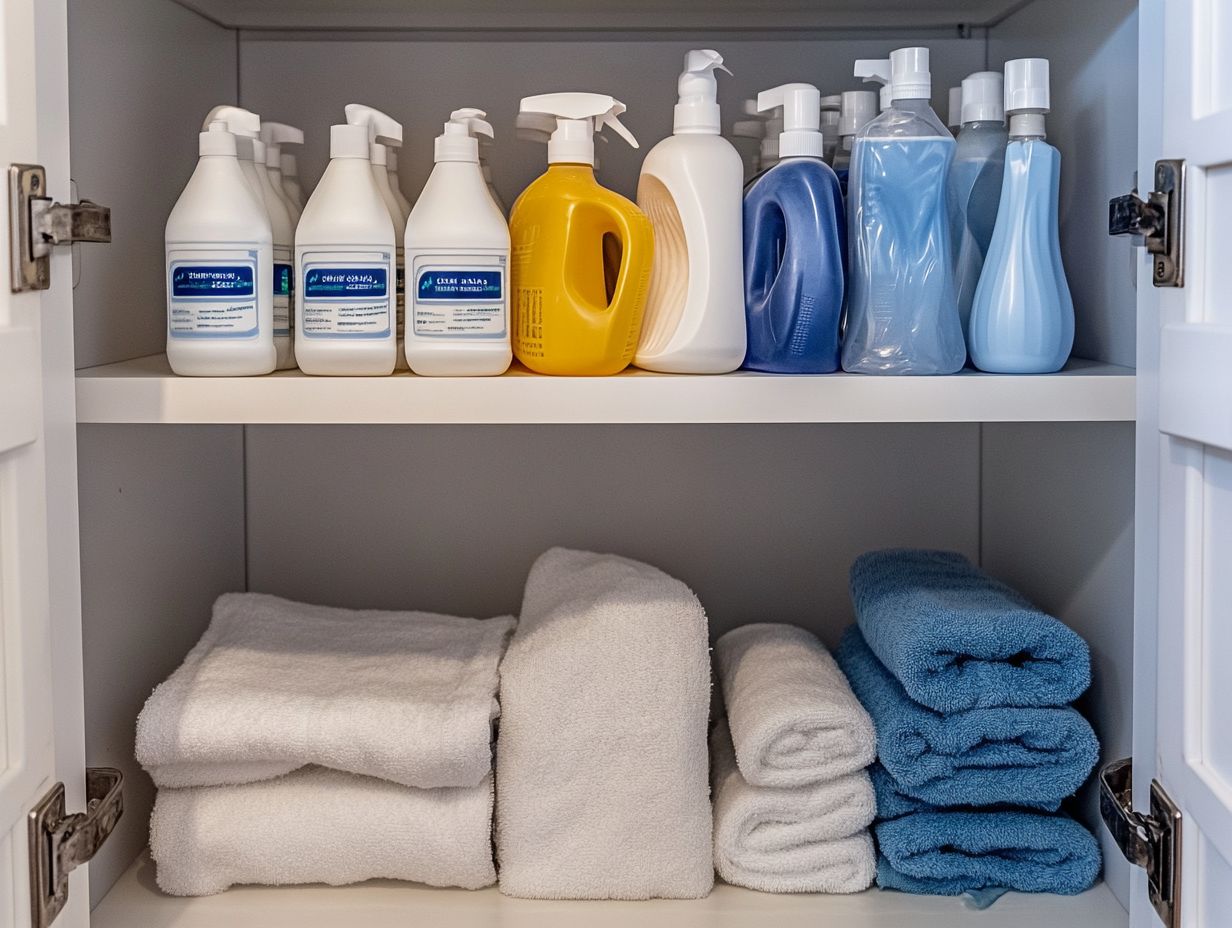
- Proper storage of cleaners is crucial to avoid chemical reactions and fire hazards.
- Improperly stored cleaners can also pose a risk to children, pets, and other household members.
- To ensure proper storage, separate chemical types, keep away from heat and flames, and use proper containers with clear labeling.
Why is Proper Storage of Cleaners Important?
Proper storage of cleaning supplies is essential for safeguarding the safety and well-being of everyone in your household, particularly in areas like Federal Way, WA, where the use of cleaning products often involves hazardous chemicals. Consulting resources like the American Cleaning Institute and National Capital Poison Center can provide additional guidance on safety protocols.
When cleaners are not stored correctly, the risks escalate, potentially leading to severe consequences such as accidental poison exposure, contamination, or even fires. This is especially important for households with children who might be at higher risk.
It’s crucial to implement safe cleaning routines immediately to protect your loved ones! Implementing effective organizational systems ensures a secure environment for you and your loved ones. Additionally, storing cleaning supplies in their original containers and following guidelines provided in the safety data sheet can be beneficial.
What Are the Risks of Improperly Stored Cleaners?
Improperly stored cleaners present substantial risks that can lead to perilous situations in both homes and workplaces, especially in Federal Way, WA. The potential dangers include accidental poisoning from hazardous chemicals, harmful chemical reactions that might cause damage or injury, and fire hazards that could jeopardize lives and property. Following the rules for safely handling chemicals and conducting regular checks to identify potential hazards are critical steps in ensuring safety.
This reality emphasizes the necessity for rigorous safety protocols and assessment measures to guarantee that cleaning products are handled and stored with the utmost care. Regular routine safety checks and the use of safety equipment can further mitigate risks.
1. Chemical Reactions
Chemical reactions can occur when incompatible cleaning products are stored together, potentially giving rise to dangerous fumes or even explosive situations. It is essential for you to understand the chemical composition of your cleaners and adhere to proper chemical storage guidelines to prevent hazardous outcomes.
For instance, common household cleaners like bleach and ammonia, when mixed, produce toxic chloramine vapors that can lead to severe respiratory issues. Similarly, if you combine acidic cleaners, such as vinegar, with alkaline substances, you may inadvertently release harmful gases.
To mitigate these risks, it is crucial for you to implement safety protocols in your household, such as clearly labeling products and keeping incompatible substances stored separately. Using proper containers and emergency preparedness measures can further ensure safety. Educating all family members about the proper handling and potential dangers associated with these cleaners will create a safer living environment, significantly reducing the risk of accidental exposure to hazardous reactions that could impact everyone s health.
2. Fire Hazards
Cleaning supplies can present significant fire hazards if not stored correctly, especially those containing flammable materials (substances that can easily catch fire) that may ignite when exposed to heat or flames. You must take action with proper storage practices, such as keeping cleaners away from heat sources, to prevent fires and ensure safety in both your home and workplace.
Always consult the safety data sheet for specific instructions on handling and storage. Certain cleaning agents, including aerosol sprays and solvents, are particularly infamous for their combustible properties. Often overlooked, these products can ignite rapidly, leading to serious harm.
Proper labeling and the use of original containers can prevent mishandling. Therefore, it’s imperative to store these items in cool, well-ventilated areas, away from direct sunlight and any potential ignition sources. Utilizing appropriate containers and ensuring the lids are tightly sealed can significantly reduce risks.
Equally crucial is your preparedness for emergencies. Having a fire extinguisher readily accessible, clear signage, and a clear escape plan in place can be invaluable in critical situations. By taking these precautions, you can effectively mitigate the potential dangers associated with your cleaning supplies.
3. Exposure to Children and Pets
Exposure to improperly stored cleaning chemicals poses a serious risk to your children and pets, who might inadvertently ingest or come into contact with these hazardous materials. You must take action with safety measures, such as using child-proof locks and proper labeling, to safeguard these vulnerable household members.
Consider this: approximately 70,000 children visit emergency rooms each year due to accidental poisonings involving household cleaning products. This statistic highlights the alarming prevalence of this danger. Pets are not exempt from these risks either; exposure to common cleaning ingredients has been linked to an increase in veterinary visits.
Liquid laundry packets pose a significant risk to both children and pets due to their attractive appearance and high concentration of chemicals. By utilizing safety gear, such as:
- Gloves
- Masks
- Child-proof locks
During your cleaning sessions, you can significantly reduce risks for everyone in your household. Regularly conducting safety checks of your storage spaces ensures that chemicals are securely locked away and out of reach, creating a safer living environment that prioritizes the well-being of all family members.
How Should Cleaners Be Stored?
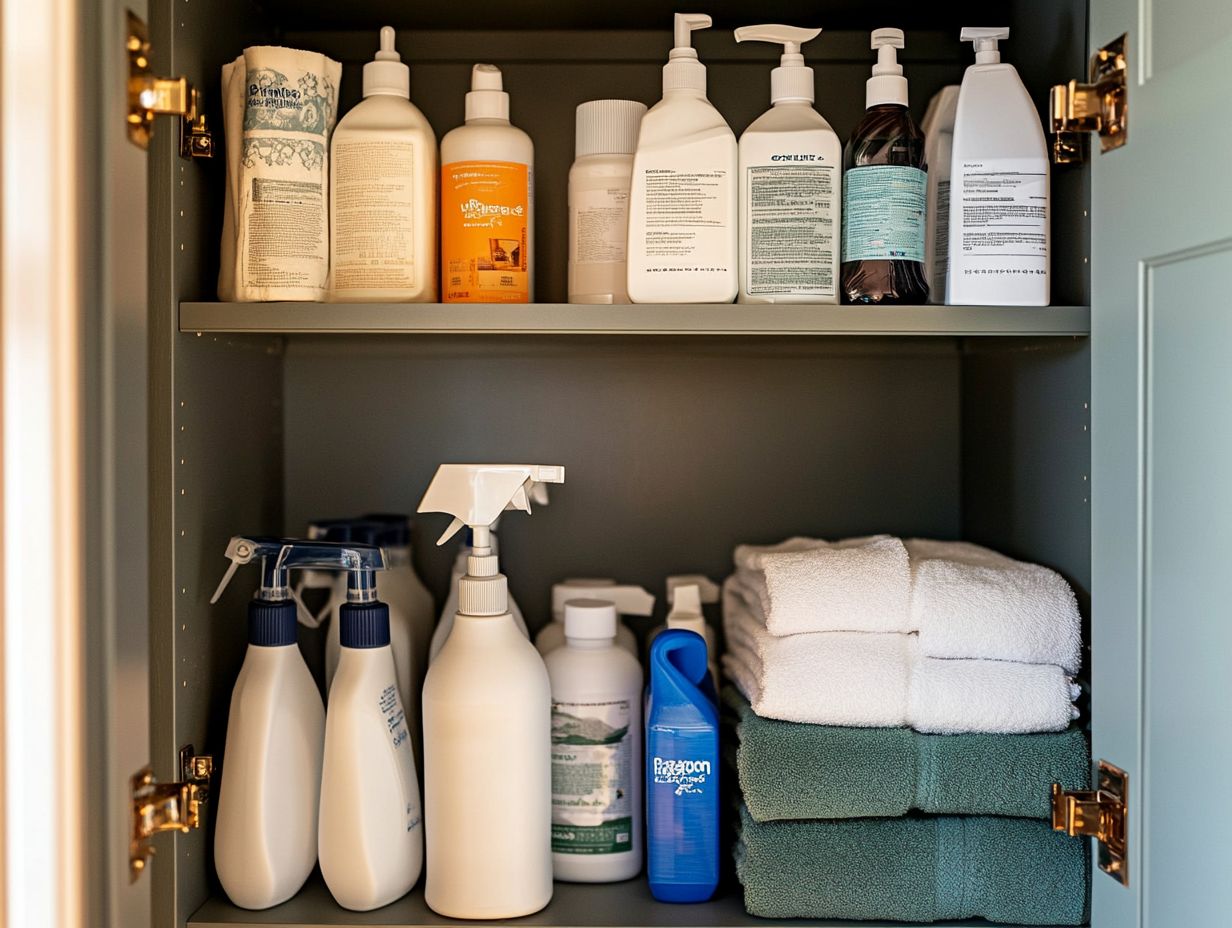
Learn the best practices for safely storing your cleaning supplies.
Storing cleaners correctly is crucial for maintaining both safety and the longevity of your products, particularly in places like Federal Way, WA. Following advice from professional sources such as House Digest and Martha Stewart Living can provide additional insights into proper storage practices.
To ensure optimal conditions, you should designate specific storage solutions for your cleaners, keeping them away from any heat sources and placing them in well-ventilated areas. Investing in proper labeling systems like the PLUS Label System can also help maintain organized and safe storage spaces.
This approach minimizes the risk of chemical reactions and safeguards the well-being of everyone in your household.
1. Separate Chemical Types
Keep cleaning chemicals separate to prevent dangerous reactions and ensure your safety. Categorizing your cleaners avoids mixing incompatible substances that could lead to hazardous situations.
Store strong acids, like toilet bowl cleaners, far from ammonia-based products found in glass cleaners. Their interaction can produce toxic fumes. Also, keep bleach away from vinegar; this combination creates harmful gases.
Label containers clearly and use color-coded storage bins for quick identification. Regularly check your supplies to identify outdated products that may pose safety risks.
2. Keep Away from Heat and Flames
Store cleaning products away from heat and flames to minimize fire hazards. Many cleaners contain flammable materials that can ignite if not stored properly.
Keep products like bleach, ammonia, and aerosol sprays in a cool, ventilated area. Heat can cause pressure buildup and potentially lead to explosions.
Regularly check for heat sources, such as appliances or direct sunlight. Using labeled containers helps ensure products are stored upright and securely.
3. Store in a Well-Ventilated Area
Storing cleaning supplies in a well-ventilated area prevents harmful fumes from building up. Proper ventilation protects your household from potential health risks associated with cleaning chemicals.
Position cleaning products near windows or in areas with exhaust fans to improve airflow. Check your ventilation systems regularly to ensure they work effectively.
Taking these steps fosters a safer and healthier environment at home. Choose non-toxic products to enhance safety for your family.
4. Use Proper Containers
Using the right containers for your cleaning products is essential. It helps preserve their effectiveness and prevents spills or leaks. Opt for sturdy containers that are clearly labeled. These should be designed to avoid contamination and ensure safe handling. Following safety guidelines for handling chemicals provides additional support in selecting appropriate containers and labeling systems.
These storage solutions should be robust and crafted from materials that resist chemical reactions, such as high-density polyethylene (a strong plastic that doesn’t react with chemicals) or glass. It’s crucial to know exactly what each container holds, making proper labeling vital.
Clear, waterproof labels should identify the contents and provide critical safety information, including hazard warnings and first aid instructions. For example, a dark-colored bottle might hold a potent cleaner, while a convenient spray bottle could be perfect for everyday tasks. Implementing clear signage can enhance safety measures.
Implementing safety protocols, such as using childproof locks and storing containers in a locked cabinet, greatly enhances safety. This ensures cleaning products remain out of reach from children and pets while preserving the integrity of the chemicals inside. Child-proof locks and locked cabinets are essential for effective chemical storage, reducing the risk of poison exposure.
What Are Some Tips for Proper Storage of Specific Cleaners?
Whether you are in Federal Way, WA, or elsewhere, proper storage of your cleaning supplies is crucial. This maximizes their effectiveness and ensures safety, especially with common household cleaners.
Different cleaners, like bleach and ammonia, require tailored storage solutions. This helps prevent unwanted chemical reactions and guarantees safe usage. Thoughtful organization enhances both their performance and your peace of mind. Organizational systems like labeled containers and childproof locks can significantly improve your cleaning supply storage.
1. Bleach
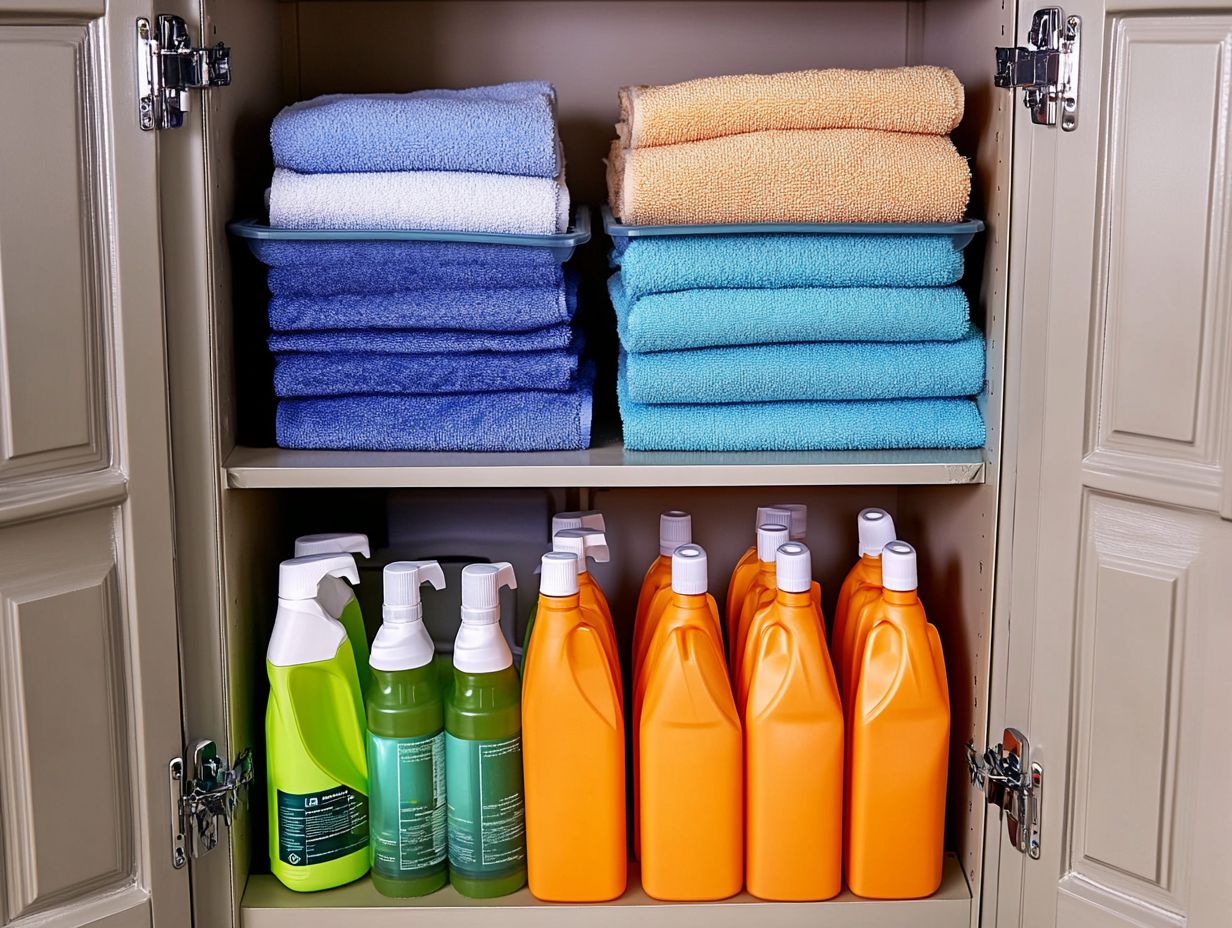
According to experts from the American Cleaning Institute, always store bleach in its original container. Ensure it is tightly closed and kept away from direct sunlight to preserve its effectiveness and prevent degradation. Clearly labeling bleach containers is crucial to avoid accidental mix-ups with other cleaning products.
Improper storage can lead to hazardous situations, including accidental spills or reactions with incompatible substances. For your safety, keep bleach out of reach of children and pets, as ingestion or contact can be harmful. This is essential for keeping your family safe!
When handling bleach, wear protective gear like gloves and goggles. This minimizes the risk of skin and eye contact, which can cause irritation or injury. Additionally, maintain a well-ventilated area during use to reduce the risk of inhaling harmful fumes.
By following these protocols, you can ensure safer handling and storage of bleach, significantly decreasing potential risks.
2. Ammonia
Store ammonia away from bleach and other cleaners to prevent dangerous reactions. Clearly label containers and keep them in a cool, well-ventilated area to enhance safety.
Use a tightly sealed container to prevent evaporation. Ensure it is out of reach of children and pets to avoid accidental exposure.
Train staff on safe handling and implement secondary containment methods like spill trays. This can help manage leaks and further contribute to a safe environment.
Following best practices ensures the integrity of ammonia while minimizing risks.
3. Glass Cleaners
Store your glass cleaners in a cool, dry place away from heat sources, especially if they contain alcohol. Proper labeling is essential for safe identification and use.
Many glass cleaners may contain ammonia or harsh chemicals. Keep them away from incompatible products like bleach to avoid dangerous reactions.
Always read the safety data sheets and follow manufacturer’s instructions for safe handling. Use personal protective equipment, such as gloves and goggles, to minimize risks.
4. Dishwashing Detergent
Keep dishwashing detergents in their original containers and store them in a cool, dry area. Clear labels prevent mix-ups with other products.
This practice keeps the cleaning agent effective and safe. Ensure these products are out of reach of children and pets to prevent accidental use.
Choose a cool, dark storage space like a pantry or cupboard to protect them from sunlight. Don’t forget to check expiration dates for safety!
By following these simple guidelines, you can extend the life of your dishwashing detergent and keep your household safe!
5. All-Purpose Cleaners
Store your all-purpose cleaners in their original containers, far from direct sunlight and heat sources, to maintain their effectiveness and prevent any degradation. Proper labeling is crucial; it helps you avoid cross-contamination which happens when cleaning products mix, making them less effective or unsafe with other cleaning products. Experts like those at Savannah, Sort and Sweet Inc, emphasize the importance of this practice.
Keep these versatile cleaners safely out of reach of children and pets to ensure a secure household environment. When organizing your cleaning supplies, position them in a cool, dry area ideally within a locked cabinet to minimize the risk of accidental spills or misuse. Understanding the importance of proper cleaner storage can help in accident prevention and ensure cleaning safety.
To enhance safety and usability, use clear, easy-to-read labels that clearly indicate the product’s contents and any relevant safety warnings. Regularly review your storage conditions, ensuring that any outdated or unused cleaners are disposed of properly to eliminate potential hazards.
What Are Some Common Mistakes in Storing Cleaners?
Many people don t know that common mistakes in storing cleaning supplies can create significant safety hazards and diminish the effectiveness of the products you rely on. It’s easy to underestimate the importance of proper labeling, selecting appropriate containers, and separating incompatible chemicals. Consulting resources like BHG and Real Simple can provide valuable organizing tips.
However, neglecting these crucial practices can lead to potentially dangerous situations that put you and your environment at risk.
How Often Should Cleaners Be Checked and Replaced?
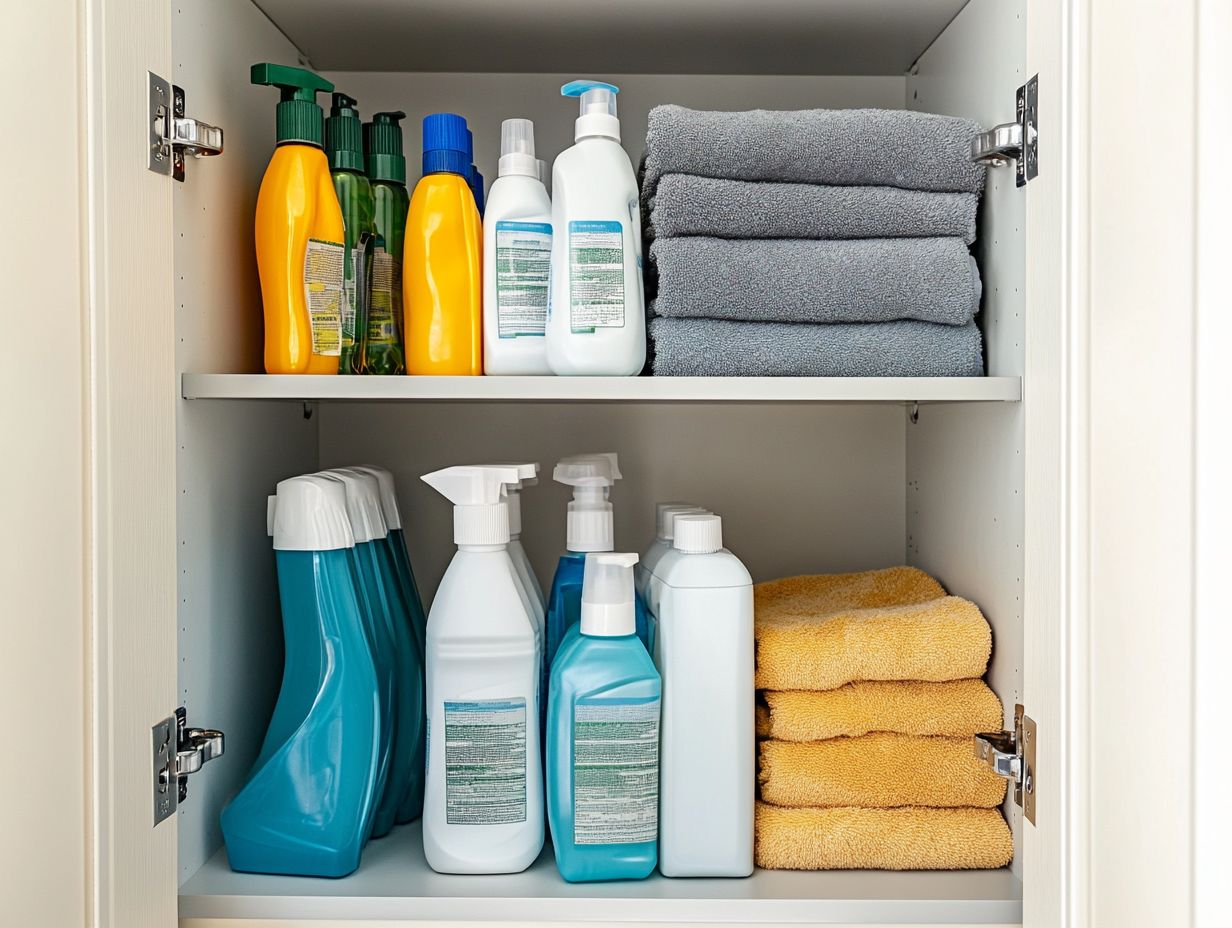
Make it a habit to check and replace your cleaning products regularly. This simple step ensures your home stays safe and clean! Many cleaning supplies come with expiration dates that can significantly impact their performance. By establishing a routine for safety checks, you create a safe cleaning environment, especially in homes with children and pets.
To identify expired products, simply look for the expiration date printed on the label or check for any unusual changes in color, separation, or odor. Routine safety checks help maintain a safe cleaning environment.
Set a monthly reminder to check your cleaning supplies. Use a checklist to keep track of what needs examination, streamlining the process and ensuring that no item goes overlooked.
Start organizing your cleaning supplies today for a safer home!
What Should Be Done with Unused or Expired Cleaners?
Did you know that improper disposal of cleaning products can harm our environment? Proper disposal of unused or expired cleaners is essential to prevent environmental contamination and ensure your safety. Knowing how to dispose of harmful cleaners is crucial for responsible cleaning practices, especially if you reside in Federal Way, WA.
Not only does this minimize the risk of accidental poisoning or injury, but it also safeguards local wildlife and waterways. Familiarize yourself with local regulations regarding the disposal of cleaning products, as many communities offer designated facilities or hazardous waste collection events. This aligns with best practices for emergency preparedness and cleaning safety.
Review any safety protocols associated with handling these substances. For instance, using gloves and working in well-ventilated areas can significantly reduce health risks. By adhering to these best practices, you can contribute to a cleaner, safer environment while also upholding your community s health standards.
Systematic organizational systems like checklists can further streamline your cleaning routines and ensure compliance with safety measures.
Frequently Asked Questions
Why is it important to properly store cleaners?
Proper storage of cleaners helps to maintain their effectiveness and prolong their shelf life. It also ensures the safety of those who handle the products. As advised by professional cleaning services, proper storage is crucial for cleaning safety.
What is the best location to store cleaners?
Ideally, cleaners should be stored in a cool, dry place away from direct sunlight and heat sources. A well-ventilated area is also recommended. For instance, storing them in a facility that adheres to guidelines from the American Cleaning Institute can enhance safety.
How should I label my cleaners when storing them?
Clear, waterproof labels should do more than just identify the contents; they must also provide critical safety information, including hazard warnings and first aid instructions. For example, a dark-colored bottle might house a potent cleaner, while a convenient spray bottle could be perfect for everyday tasks.
It is important to clearly label all cleaners, including kitchen cleaners and disinfectants, with their names, usage instructions, and any safety precautions. This helps to prevent confusion, poison exposure, and potential accidents.
What is the proper way to store cleaning chemicals and hazardous chemicals?
Cleaning chemicals and hazardous chemicals should be stored separately from each other and particularly from any food items. They should also be stored in their original containers with the lids tightly closed, preferably in a storage space with proper ventilation and clear signage.
What are some common mistakes people make when storing cleaners and cleaning products?
Some common mistakes include storing cleaners and cleaning products in unmarked containers, keeping them in damp or humid areas, and storing them near sources of heat or open flames. Additionally, not using child-proof locks and improper labeling can lead to significant safety hazards.
How often should I check my stored cleaners for expiration dates and perform routine safety checks?
Check the expiration dates of your cleaners regularly and dispose of any expired products. Performing routine safety checks and following COSHH regulations (Control of Substances Hazardous to Health) can help to ensure their effectiveness and safety for use. Consider using organizational systems to keep track of your cleaning materials and cleaning equipment.
Take your cleaning safety seriously. Share this information with others and encourage them to manage their cleaning products responsibly!

